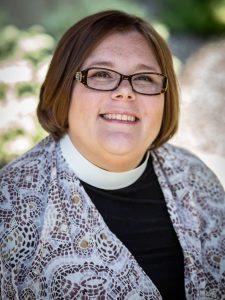 By Pastor Norma Malfatti
By Pastor Norma Malfatti
We all have experiences during our growing up years that shape our values, faith, and viewpoint of the world. My first communion class taught me that grace is God’s love given freely to everyone, all the time, no matter who they are or what they’ve done. God loves because that’s who God is.
When my grandfather was diagnosed with cancer and died a short six months later, I learned that God’s love doesn’t stop bad things from happening, even when one has the faith and patience of Job. As an older teenager I also learned important lessons in financial stewardship, and what it means to be the church together, watching the adults argue about the budget at an annual meeting.
“Viewing this incident as an adult, I can see that young people are always paying attention and learning from the adults around them.”
I can still see myself sitting in the gym of the education building, having attended the meeting to ensure quorum not because my teenage self was interested in church business. The meeting proceeded as you might expect, people gave reports, we heard about Sunday School numbers, the enrollment at our pre-school, and how many mittens and hats we collected that winter. All innocuous, but important, work we did as a community of faith.
Then we got to the budget. We had a surplus from the previous year, … sort of.
YOU SEE, WE HAD a surplus because we had not yet met our commitment for synod benevolence, what we now call mission support. We had paid all our other commitments – salaries, building costs, supplies for ministry, and gifts to community partners. However, our treasurer did not see synod benevolence as a commitment equal to those others but rather an optional gift to the synod.
There were two very distinct camps. One, led by Harry, who also happened to be on synod council at the time. The other led by Randy, the congregation’s treasurer.
Randy wanted to use the surplus funds to go into the organ fund. We had begun raising money to replace our organ. It was working fine, and the musician had no complaints, but it wasn’t the fanciest of organs and was beginning to require more complex care at its “annual tune up. So, a new organ was on the horizon, but not an immediate need.
Harry, on the other hand, wanted to use the “surplus” to meet our commitment to the synod. He spoke passionately about what the synod did with our money and why our commitment was important. First and foremost, the synod depended on congregations meeting its commitments to do its work; congregations’ generosity was (and remains today) the primary way synods are funded.
And, the work that we did together as a synod was important: We helped our sister congregations when they were going through difficult times. We cared for our neighbors through Lutheran Social Services and Lutheran Immigration and Refugee Service – both critical ministries in the New York City area. We trained leaders, both pastors and lay leaders, to better serve their congregations. We were also a synod (Metro New York) that was incredibly diverse; on Sundays more than 40 languages were spoken in worship – 40 languages! Our benevolence helped make that happen.
Second, if we as a congregation considered our commitment to the synod as optional, how could we expect people in the congregation to fulfill their financial commitments. If we wanted to keep building generosity and partnership into the DNA of our congregation, this was not the way to do it. Instead, failing to fulfill our commitment showed our lack of commitment to being the church together and pursuing God’s mission in the world.
“I can still see myself sitting in the gym of the education building, having attended the meeting to ensure quorum not because my teenage self was interested in church business.”
In the end, the organ fund camp won the debate. I was baffled. Harry’s words moved me about what it means to be a part of a denomination, the sacrifices we sometimes need to make to follow God’s ways, and what it means to lean into the abundance that comes from God rather than the scarcity mindset the world tries to instill in us.
Viewing this incident as an adult, I can see that young people are always paying attention and learning from the adults around them. I don’t think Harry, Randy, and the other adults know the impact they had on me. To this day I am a champion of mission support, not because I serve on synod staff but because of that congregational meeting.
So, when I visit your congregation and get to say thank you for your mission support, it’s not a required statement of synod staff people. I am truly grateful deep in my bones for your partnership and generosity. You are making a difference in people’s lives both outside the walls of your congregation and within them. Perhaps there is a teenager who is learning from you about what it means to follow Jesus and be in partnership with others and that may be one of the most important lessons they learn.
(The names of the leaders of the two “camps” have been changed because they were not contacted to grant permission for the use of their names before the writing of this story. But, … they are real people!)
